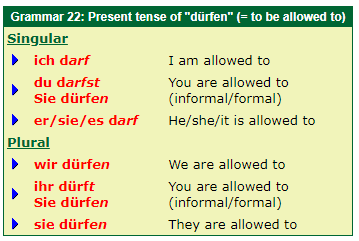Present tense of "dürfen"
We have already had an introduction to German modal verbs and their usage in Chapter 8 of this course. Here are the present tenses of two more modal verbs which we have encountered in this chapter:

Usage of "dürfen"
The verb "dürfen" corresponds to English "be allowed to" or "can" (in the sense of having the permission to do something).
Was dürfen Sie essen?
(What are you allowed to eat?)
Dürfen Sie Alkohol trinken?
(Can you drink alcohol?)
Great care must be taken when translating the English word "can" into German. You need to distinguish between two different possible meanings of "can": "to be able to do something" (= "können") and "to have permission to do something" (= "dürfen"). For example:
Ich kann Rad fahren.
(I can (= know how to) ride a bicycle.)
Ich darf Rad fahren.
(I can (= have permission to) ride a bicycle.)
Andrea kann Deutsch.
(Andrea can (= knows how to) speak German.)
Andrea darf nach Deutschland fahren.
(Andrea is able to (= has permission to) go to Germany.)  英语
英语 日语
日语 韩语
韩语 法语
法语 西班牙语
西班牙语 意大利语
意大利语 阿拉伯语
阿拉伯语 葡萄牙语
葡萄牙语 越南语
越南语 俄语
俄语 芬兰语
芬兰语 泰语
泰语 丹麦语
丹麦语 对外汉语
对外汉语

